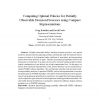Free Online Productivity Tools
i2Speak
i2Symbol
i2OCR
iTex2Img
iWeb2Print
iWeb2Shot
i2Type
iPdf2Split
iPdf2Merge
i2Bopomofo
i2Arabic
i2Style
i2Image
i2PDF
iLatex2Rtf
Sci2ools
123
click to vote
AAAI
1996
1996
Computing Optimal Policies for Partially Observable Decision Processes Using Compact Representations
: Partially-observable Markov decision processes provide a very general model for decision-theoretic planning problems, allowing the trade-offs between various courses of actions to be determined under conditions of uncertainty, and incorporating partial observations made by an agent. Dynamic programming algorithms based on the information or belief state of an agent can be used to construct optimal policies without explicit consideration of past history, but at high computational cost. In this paper, we discuss how structured representations of the system dynamics can be incorporated in classic POMDP solution algorithms. We use Bayesian networks with structured conditional probability matrices to represent POMDPs, and use this representation to structure the belief space for POMDP algorithms. This allows irrelevant distinctions to be ignored. Apart from speeding up optimal policy construction, we suggest that such representations can be exploited to great extent in the development of ...
AAAI 1996 | Dynamic Programming Algorithms | Intelligent Agents | Partially-observable Markov Decision | POMDP Solution Algorithms |
Related Content
| Added | 02 Nov 2010 |
| Updated | 02 Nov 2010 |
| Type | Conference |
| Year | 1996 |
| Where | AAAI |
| Authors | Craig Boutilier, David Poole |
Comments (0)

